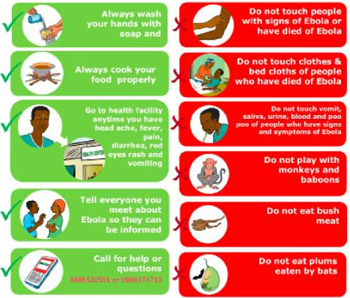Jeddah, Aug 3: Gulf ministries of Health have taken all health measures to prevent Ebola virus patients from Sierra Leone, Liberia, Nigeria, and other African countries from entering any Gulf country, said Professor Tawfiq Ahmad Khoja, director-general of the Executive Health Office for Gulf Cooperation Council countries.
 The measures are being adopted as the World Health Organization warned west Africa’s Ebola-hit nations on Friday that the epidemic was spiraling out of control and could spread to other countries, causing “catastrophic” loss of life and severe economic disruption. WHO chief Margaret Chan told the leaders of Guinea, Sierra Leone and Liberia that the response to the epidemic had been “woefully inadequate,” revealing that the outbreak was “moving faster than our efforts to control it.”
The measures are being adopted as the World Health Organization warned west Africa’s Ebola-hit nations on Friday that the epidemic was spiraling out of control and could spread to other countries, causing “catastrophic” loss of life and severe economic disruption. WHO chief Margaret Chan told the leaders of Guinea, Sierra Leone and Liberia that the response to the epidemic had been “woefully inadequate,” revealing that the outbreak was “moving faster than our efforts to control it.”
“The disease does not constitute any fears to Gulf countries, particularly the Kingdom, which has taken precautionary measures for Umrah and Haj seasons,” said Prof. Khoja.
Gulf ministries of Health are coordinating with the WHO to prevent the spread of disease outside the places where it has spread.
The Kingdom’s ministries of Health and Haj are doing extensive coordination work globally and regionally with more emphasis on airports. “The symptoms and the incubation period are fast; therefore, it is highly unlikely that Ebola cases might reach the Kingdom.”
Lebanon too is acting to adopt a set of measures to counter the spread of Ebola. With 20,000 citizens living in three countries affected by an Ebola outbreak, Lebanon is taking a series of measures to prevent the virus reaching its shores. Health Minister Wael Abu Faour, during a tour of Beirut airport, said the ministry “has asked all airlines, particularly those bringing people from Sierra Leone, Guinea and Liberia, to inform Lebanese authorities about anyone displaying suspicious symptoms.”
Any traveler with such symptoms would be turned over for assessment to an 18-person team of doctors and nurses posted at the airport.
The Foreign Ministry, meanwhile, called on Lebanese embassies to ensure that citizens abroad were kept informed of the outbreak, taking appropriate precautions and being given assistance if they wanted to return home.
Nearly 12,000 Lebanese citizens live in Sierra Leone, with another 6,500 in Liberia and 3,500 in Guinea, the three African nations worst affected by the Ebola outbreak.
For its part, the Labor Ministry said Friday it has suspended the delivery of work permits to residents of the three countries.
“As a result of fears about public health and to prevent an Ebola epidemic, the Labor Ministry is no longer receiving work permit requests from residents of Sierra Leone, Guinea and Liberia,” it said.
An official at the ministry said the number of workers affected was limited and the decision was “a precautionary measure”.
There is no vaccine for the highly-contagious disease, and the current outbreak has claimed nearly 730 lives and infected more than 1,300 people since the beginning of the year. Ebola causes severe muscular pains, fever, headaches and, in the worst cases, unstoppable bleeding.





Comments
Add new comment